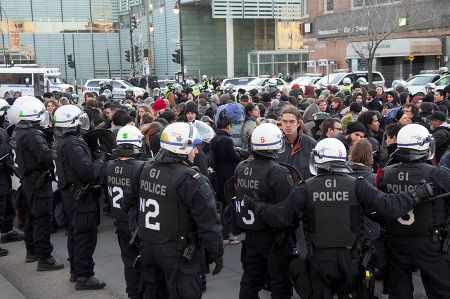MONTREAL—As the city of Montreal tightens its belt-buckle and is cutting budgets, two Montrealers who are challenging the city's regulations around demonstrations are questioning the amount of resources the city is putting in to defend the bylaws.
“It seems like there is room for austerity measures around everything except repression,” said Julien Villeneuve, better-known as Anarchopanda, in an interview.
Documents obtained by Villeneuve and Jaggi Singh, both plaintiffs in their own separate court challenges against municipal bylaw P-6, show that the city has decided to turn to private lawyers in order to defend the regulation. The documents were provided to the Montreal Media Co-op for review by Singh and Villeneuve.
The documents (here and here) are authorizations for the city's legal department to contract the law firm Bélanger Sauvé to represent Montreal in the two cases. The documents show that due to a departure from the city's legal department, they are no longer able to ensure representation in-house, and are therefore seeking outside counsel. In the case of Singh, they are contracting the firm for $40,000 in services (plus tax) and for Villeneuve, $70,000 (plus tax), to a total of $110,000 before taxes.
In a joint release, Villeneuve and Singh argue that this shows an inability of the city to provide resources to defend its own bylaw, and demonstrates an inability to “cope with the consequences” of its heavy-handed policing of protests in the city. “This is an incredible waste of money,” the release quotes Villeneuve as saying.
Originally adopted in 2001, bylaw P-6 regulates “the prevention of breaches of the peace, public order and safety, and the use of public property” and is used to police demonstrations and protests in the city. It allows police to demand the dispersal of any assembly it views as potentially troubling the peace. While generally obscure, it gained notoriety during the 2012 Quebec-wide student strike and mass mobilizations, when Montreal city council amended the bylaw to include two new regulations: one which requires demonstration organizers to provide their route and schedule to police in advance, and another banning individuals at assemblies from covering their faces (including with scarves or hoods). The amendment also drastically increased the cost associated with violations of the bylaw, changing the range of fines for a first offence from $100-$300 to $500-$1,000; those with multiple infractions of the bylaw now face fines up to $3,000, up from the previous maximum of $1,000.
Both Singh and Villeneuve have launched constitutional challenges against differing aspects of P-6 after they both received tickets under the regulation at various protests over the past two years. Villeneuve's case is set to be heard on December 18 and 19, 2014, while Singh will head to court for another preliminary hearing on Dec. 4, 2014, with the full case set to be heard starting April 8, 2015.
Singh, a Montreal community organizer who works for the Quebec Public Interest Group at Concordia and volunteers with several other organizations, is challenging the constitutionality of the entirety of the P-6 bylaw. Villeneuve, a CEGEP philosophy professor known as Anarchopanda for attending protests dressed in a panda costume starting during the Quebec student strike, is challenging the two newest articles of the bylaw, requiring the advance disclosure of a protest's itinerary and that those attending a public assembly not cover their faces. In one well-publicized case, police confiscated Villeneuve's panda head as evidence against him after they deemed him to be infringing on the bylaw at a protest.
Multiple requests to the city's media relations department to comment on the documents and the duo's critiques went un-answered before publication deadline.
It is unclear how much more it costs the city to contract outside counsel than if they were to use in-house counsel, but in general lawyers in private firms are paid higher wages than those employed by the municipal government.
Singh and Villeneuve point out that the $110,000 is just a fraction of what has been spent on enforcing P-6 to date, and doesn't include any costs incurred by the city on just their two cases up until now. Nor does it include any court or administrative fees that will be incurred.
“One hundred and ten thousand dollars is a ton of money that could be put to better use than defending a repressive bylaw. Furthermore, [...] the city is spending millions on defending P-6 (and if you include the policing of P-6, it's tens of millions of dollars),” argued Singh in an email interview with the Co-op.
It also points to the inability of the city to cope with the consequences of such a repressive law, said Villeneuve.
“Just look at the fact that it only takes one person leaving to throw into upheaval the legal offices of the City of montreal. I don't know what it shows: if they are badly organized, or whether there's not enough resources. [In any case] if they are going to use these resources for repression, I hope they don't have them. I would hope that the city would prioritize better.”
Singh added that this lack of resources was also on display during recent pro-formas (preliminary hearings) for the thousands mass arrested under P-6. Over the summer, there were reports of chaos at Montreal municipal court, as city officials struggled to process the hundreds of people arriving at the court. A key aspect of pro-formas is that those charged are provided with disclosure of the evidence against them and that they are given the chance to be seen by a judge, but many have reported to the Co-op that the evidence presented was incomplete, they were not informed of their rights to see a judge, and that a heavy police presence gave an overall sense of already being seen as guilty.
“The P-6 pro-formas stretched the resources of the City of Montreal,” wrote Singh. “They had to essentially shut down the court for one day in the case of one pro-forma date,” for the arrests made on May 1, 2013 at the annual May Day rally.
The city is also facing multiple class action lawsuits revolving around political profiling used in enforcement of the bylaws. Eight of the class action lawsuits filed were approved in August, and could cost the city a total of $21 million.
Villeneuve sees hypocrisy in the city's current “discourse of austerity,” and is frustrated that the city would invest resources in repressive laws while arguing there's a lack of funds for pensions or cut slash the money available to the boroughs for public services.
“From point of view of the city [which has a budget of $4 billion], it's not a lot, but from point of view of a person, that's a lot and there's a lot that they could accomplish with that money,” he said.
For Singh, it isn't so much as the amount of finances that concerns him, but the slew of resources and tools used to undermine social movements in the city. While he's pushing forward with his lawsuit, since the beginning he has argued that the solution to P-6 will most likely not come from the courts, but from pressure in the streets. In their release, Singh and Villenueve point out that there is a large number of voices that have come together to denounce the anti-demonstration rules. Nearly 90 organizations have signed a statement saying they will not abide by the regulations.
Villeneuve for his part is optimistic about his chances in court, believing his legal team has put together a solid case for striking down the two new provisions enacted in 2012.
Whether it's in the streets or in the courts, though, it seems like the cost of P-6 for the city will continue to rise.
Tim McSorley is a freelance journalist living in Montreal and a member of the Montreal Media Co-op. Find him on Twitter @timmcsorley or visit his website at timmcsorley.com.




